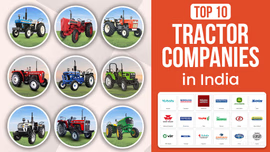Smart Diesel Saving Tips Every Farmer Should Know

Table of Contents
Introduction
Fuel is one of the main expenses for the majority of farmers. Thus, fuel efficiency is a major factor for farmers who want to maximize their profits without struggling with finances. With increasing fuel prices, it is important to ensure fuel savings through any means. There are several ways to address this issue and most effective is optimise the fuel consumption of your tractor. As tractors are widely used to plant and harvest crops, it becomes necessary to consider possible solutions to achieve optimal fuel efficiency on and off the field.
What are the Tips to Reduce Tractor Fuel Consumption?
Finding measures to save fuel while operating a tractor is crucial for any farmer. It not only helps save money but also has a positive impact on the environment. Here are some of the tips to reduce fuel consumption while operating the tractor on your farm.
Plan field operations properly
Having a correct understanding of your field so that you operate as per the right strategy not only prepares land for better crop production but also lowers fuel consumption. For example, you can prevent unnecessary fuel consumption while using the reversible disc plough with suitable field patterns. This is important for avoiding pointless overlapping and rework. In the case of small or compact fields, the continuous ploughing technique can deliver quick results. For larger fields, the more efficient method is the round and round ploughing technique. Also, avoid unnecessary detours to minimise the distance travelled and optimise fuel efficiency.
Use efficient driving techniques
Adopt efficient driving techniques to ensure ideal fuel consumption. Prevent wastage of fuel by avoiding aggressive acceleration and unnecessary idling. Work with appropriate engine rpm and gear based on the task at hand when operating in the field. Some of the best practices include avoiding sudden stops and maintaining constant speed. Do not strain the engine unnecessarily by avoiding shifting to right gear.
Monitor tyre pressure and condition
Proper tyre pressure enhances the fuel efficiency and performance of the tractor. Monitor the tyre pressure regularly to make sure it matches the recommendations of the manufacturer. If the tyre is underinflated, rolling resistance will increase, which will demand more fuel and power to run the tractor. In the case of overinflated tyres, the traction will reduce, and chances of uneven wear will increase. In the field, opt for lower tyre pressure as it reduces track depth as well as soil compaction. Go with right air pressure on the road as it reduces the rolling resistance. Also, check the condition of the tyres to ensure there is no major wear on them. A worn-out tyre will cause more slippage and burn more fuel.
Drive in the correct gear
Operating your tractor in the correct gear has a huge impact on fuel consumption. It is recommended to choose a lower gear if you need a lower speed but more power. However, if you have to work faster, select a suitable higher gear. With heavy loads, a lower gear and higher RPM ensure efficient operations. Use the Gear up and throttle back technique if the required tractor power for pulling the load is less than 70%. It involves maintaining the desired speed by selecting a higher gear and reducing the engine speed.
Choose the perfect implement
Choosing a suitable implement size is highly important to save fuel. If your tractor is too big for the implement, there will be higher and unnecessary fuel consumption. On the other hand, if the implement is oversized, overloading will cause not only excessive wear but also slow field speeds. If you are in the top gear and the tractor accelerates at full throttle, the implement size is too small. So, you need to evaluate the types of farm tasks you need to perform and then select the suitable implement.
Service and maintain the tractor regularly
One of the best ways to ensure high fuel efficiency is to maintain and service your tractor at regular intervals. The best practice is to follow the service intervals recommended by the manufacturer. Ensure optimal working condition of the tractor through scheduled routine check-ups. Pay proper attention to lubrication, filter replacements and oil changes as per the manual. Also, there should be no diesel leakage from any pipe or fuel tank. Remember to inspect fuel lines, fuel injectors, fuel pumps, and fuel tanks to prevent fuel leakage.
Only use clean fuel to ensure efficient combustion and performance. The air filter must be cleaned or replaced after assessing its condition. In the case of repairs, make sure only genuine spare parts of the manufacturer are used. Using quality lubricants can reduce maintenance costs in the long run. If you need more information about maintenance and servicing tips, check out the Tractor Maintenance Guide on Tractorkarvan.
Check smoke from the exhaust
If your tractor is producing excessive black smoke, it means fuel is being wasted. Operating the tractor in the wrong gear or using oversized implements produces more smoke. Black smoke indicates inefficient combustion of fuel, which can be due to the lack of air or too much fuel in the mixture. You need to check for faulty or dirty fuel injectors, air cleaners, turbocharger/intercooler or valves. Tune your engine to ensure fuel burns efficiently and produces less smoke.
Adopting fuel-saving practices while operating a tractor can help reduce fuel costs and environmental impact significantly. By following the tips mentioned above, you can achieve substantial fuel savings while contributing to a more productive and sustainable farming operation.


Related Blogs












